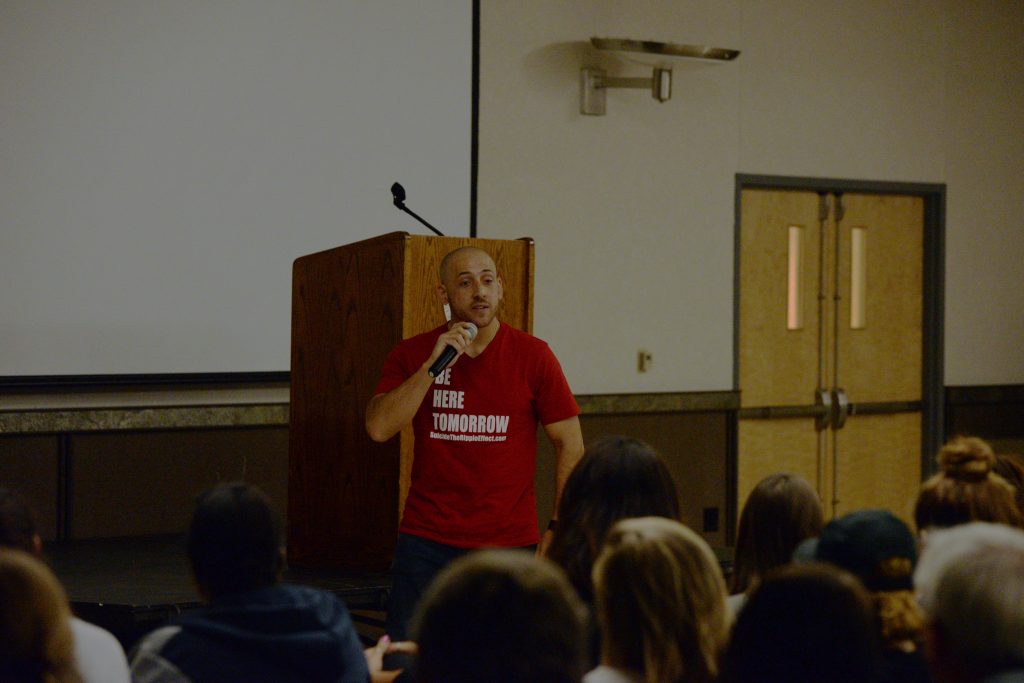
Of the approximately 2,000 people who have jumped off the Golden Gate Bridge, only 36 have survived. One of them, Kevin Hines, came to the Mandela Room on Thursday evening to share his message of mental health awareness and advocacy.
On Sept. 25, 2000, 19-year-old Hines boarded a bus to the Golden Gate Bridge with the intention of ending it all. Two years earlier, he’d been diagnosed with bipolar disorder after suffering from psychosis and paranoid hallucinations. Fearing judgement, he hid the severity of his illness from his loved ones.
Hines said the main thing he wanted the 250 students, faculty and community members in attendance to do was acknowledge their pain.
“Do yourself a favor and never ever ever silence your pain,” Hines said. “Your pain is real, it is valid and it matters because you do.”
Hines’ speech touched on stigmas surrounding mental illness and psychiatric wards. He said interpretations of popular films like “One Flew Over the Cuckoo’s Nest” contribute to a fear of mental illness and its treatment instead of an understanding. Hines recalled the people he encountered on the day of his suicide attempt to show the importance of empathy in mental health education and awareness.
“On that bus, the only human being to react out loud to my pain mocked me,” Hines said. “That is what’s wrong with some of our society [is] this ability human beings have to see someone in maybe the most pain they have ever experienced and feel nothing but fear of them and apathy for them.”
Hines urged the audience not to ignore warning signs and to offer those with mental illness help instead of judgement.
“We are not here, contrary to popular belief, for our own betterment and gain,” Hines said. “We are here to give back to those around us, those we know, those we love, those we care about, those that we don’t even like. We’re here to give back to them during their time of pain and hope that they do the same on the opposite side of the spectrum.”
Nicholas Adams, a senior majoring in psychology, said he was impressed by Hines’ storytelling and message.
“It was incredible,” Adams said. “[Hines] was able to mix in some humor and make the event entertaining, while still getting his critical message across. It was really awesome.”
Adams said although he believes BU provides useful resources, including the High Hopes Helpline and various counseling services, he believes more could still be done to help students with mental illness.
“I don’t know if we’re ever really doing enough,” Adams said. “We can always improve.”
Jemy Paulson, a sophomore majoring in integrative neuroscience, said he also believes the University’s mental health services could use improvement.
“I have heard from friends that went to the counseling center and didn’t get the help that they needed,” Paulson said. “It was almost as if they were a short-term problem that they just needed to get out the door. But I have heard that it is improving, although I personally don’t know.”
The event was a collaboration between BU and local community partners. Sponsors included the University’s Mental Health Outreach Peer Educators (M-HOPE), the Mental Health Association of the Southern Tier and Rock Against Suicide.
Dara Raboy-Picciano, coordinator of M-HOPE, helped plan the event as part of National Suicide Awareness Month, with the hope of having a public, open conversation around mental health and suicide.
“Hines understands what people who are battling mental illness are dealing with,” Raboy-Picciano wrote in an email. “Not only that, he was dealing with [suicidal] thoughts at 19 years old, which hits very close to home for college students…We hope [his] message will help break down the stigma of mental health issues that face so many people on campus and in the greater Binghamton community.”
Throughout September, M-HOPE will continue to raise awareness for Suicide Prevention Month by sponsoring prevention messaging, in the form of posters, table tents in dining halls and advertising on coffee sleeves, as well as co-sponsoring events with Residential Life Staff. Additionally, M-HOPE will roll out a new interactive peer-led presentation and suicide-prevention program for student groups and organizations.
Tamir Felsen and Julia Donnelly contributed reporting to this story.


